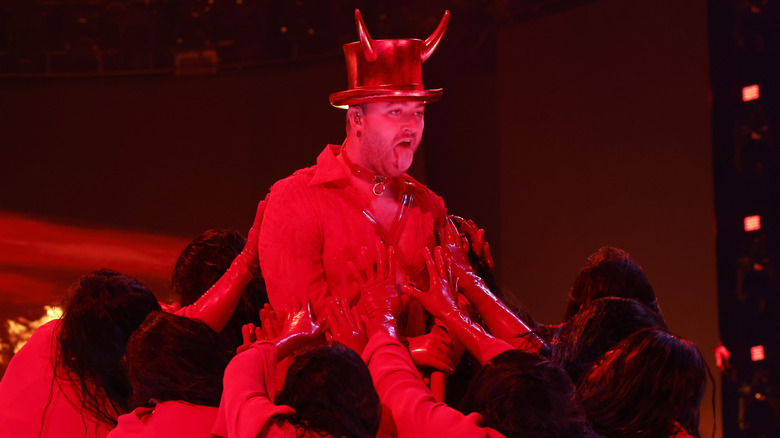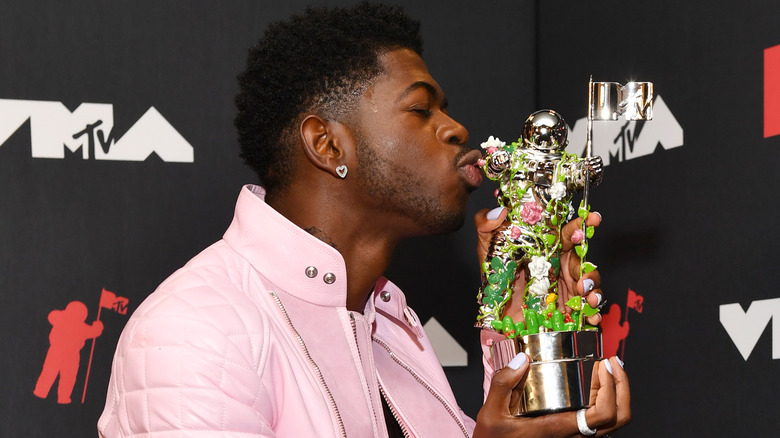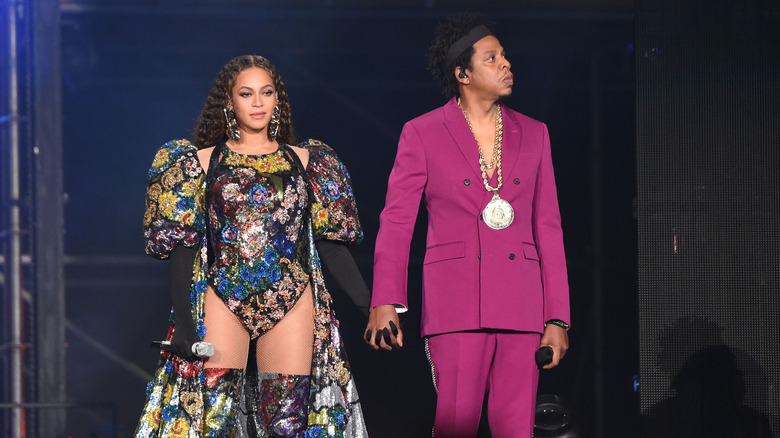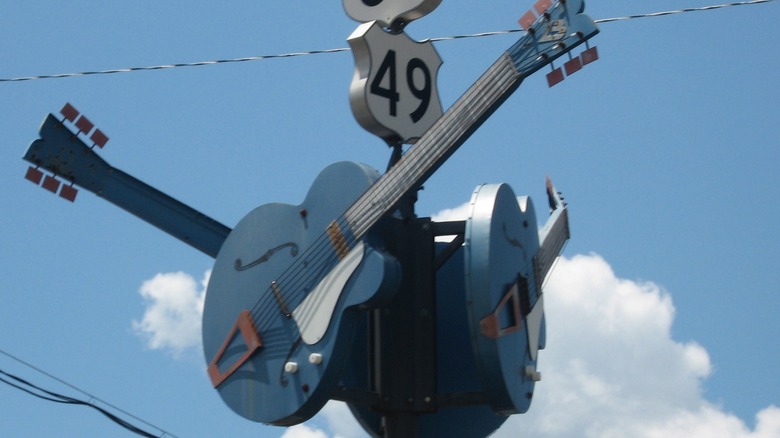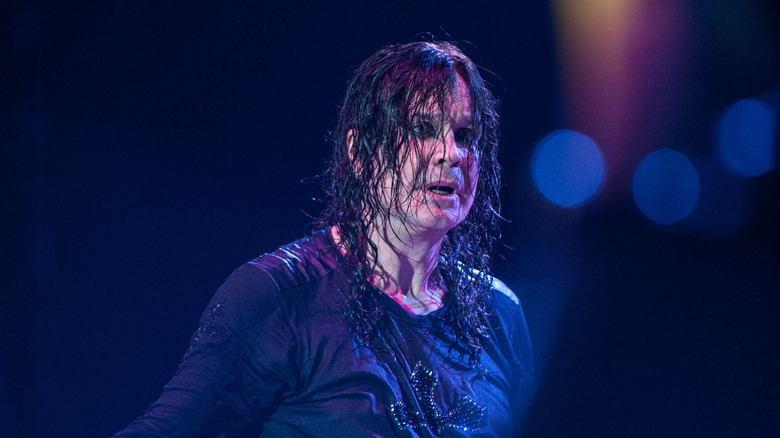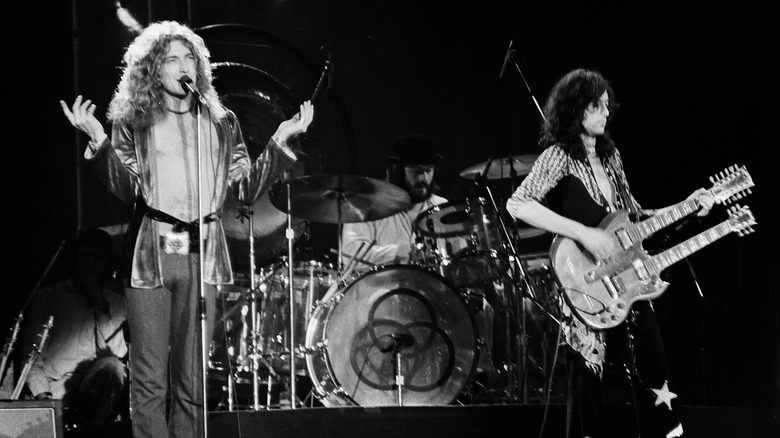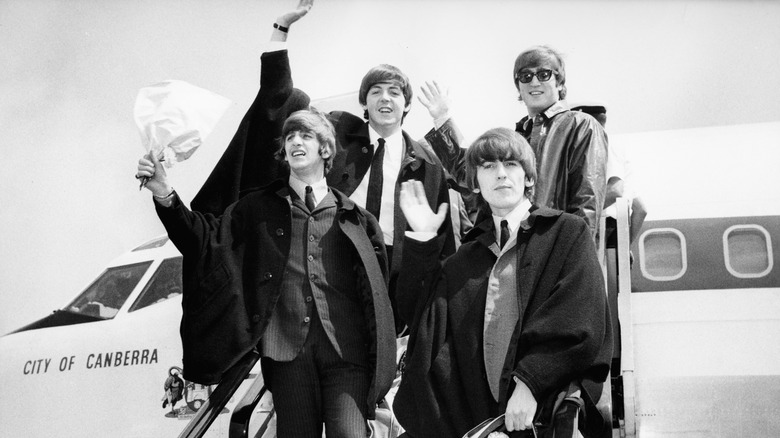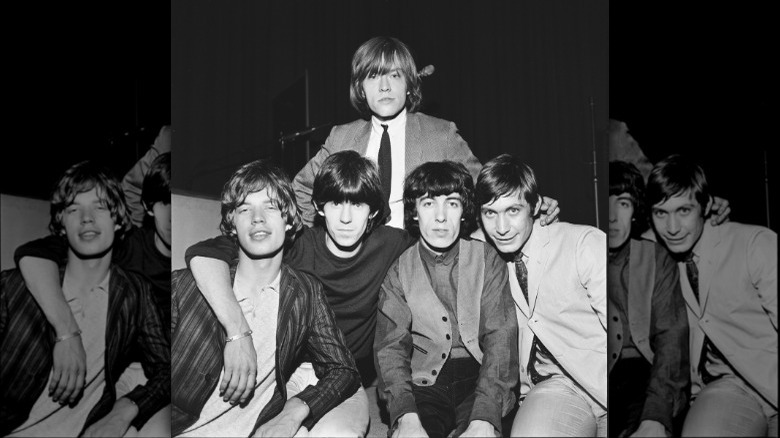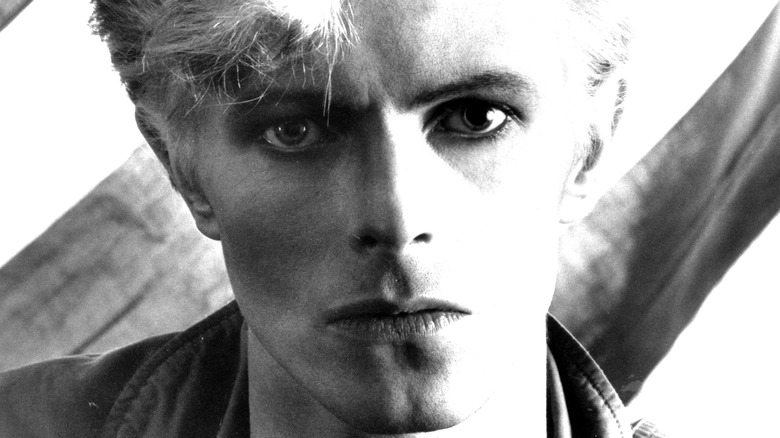Times Musicians Have Been Accused Of Devil Worship
From the early days of rock and roll to the Golden Age of hip-hop and on to the boundary-pushing chart hits of the 21st century, there have always been fears that popular music could be having a negative effect on its audience, particularly impressionable children and adolescents.
As described by Popular Music, suspicions about the potentially detrimental effects of music on society reached a fever pitch in the 1980s in the wake of the release of Prince's "Purple Rain" album, featuring the song "Darling Nikki," which contained overt sexual references in its lyrics. In response, offended parents formed The Parents' Music Resource Center, a lobbying group that sought to censor music with lyrics they considered "filthy." The lobby put together a list: the "Filthy Fifteen," a compendium of songs they found especially loathsome. "Darling Nikki" topped the list, as well as other songs identified as sexual, violent, promoting alcohol and drug use, and, perhaps surprisingly, two songs they believed were promoting the occult.
But these were not outliers. In fact, the "Filthy Fifteen" came at the time of what was known as the "satanic panic," when many became convinced that devil worship was becoming an established underground activity in American society. Not that those fears have died down: Countless artists have been accused of being in league with the devil over the years. Here are just a few of them.
Lady Gaga
Now that Lady Gaga — real name Stefani Germanotta — is considered a veteran and darling of the 21st-century pop firmament, it is perhaps easy to forget that the clean-cut lead of "A Star is Born" was considered a particularly risque performer at the start of her career. Cultivating a freak-art image that culminated in Gaga donning a dress purportedly crafted from raw meat to the MTV Video Music Awards in 2010, the "Poker Face" singer made a claim for being one of the strangest pop stars out there.
So perhaps it was no surprise that in 2012, rumors spread that Gaga's coordinated public eccentricities had roots in something darker: blood-thirsty satanism. As reported at the time by the NME, rumors abounded that while on tour in the U.K., the pop star had stayed at London's Intercontinental Hotel and left behind evidence of satanic rituals — namely, a "bath full of blood." The story was originally spread by a website called Truthquake, with a hotel worker reportedly stating: "Lady Gaga left large amounts of blood in the suite during a stay this summer. The incident was reported to the concierge, who was told to put it out of her mind." No evidence of Gaga's occult leanings was ever presented, however, and her team quickly refuted the allegation, which went no further.
Sam Smith
In recent years, it seems the biggest pop stars in the world have made the conscious choice to adopt satanic imagery in their live performances. British singer-songwriter Sam Smith, for example, drew plenty of attention in 2023 when they took to the stage at the Grammys to perform their new single "Unholy," dressed as a yassified Satan with horns emerging from their red top hat.
When described in such terms, such a performance doesn't sound particularly shocking. But it seems that the combined effect of the sexualized performance from the queer singer as well as cage dancing from their co-star, Kim Petras, a trans woman, among red stage lighting and pyrotechnics saw Smith draw an angry response from many prominent online commentators, per Billboard.
Conservative senator and 2016 Presidency hopeful Ted Cruz tweeted: "This...is...evil[,]" while other Twitter users described the devilish show as "satanic" and "a tribute to Satan." Such tweets generated thousands of likes and retweets from horrified viewers. Madonna, who introduced Smith's performance, also received some flak, with eagle-eyed viewers claiming that the hairstyle she wore to the Grammys was reminiscent of a new statue that had recently been unveiled in New York that has been accused of being a Pagan image (via Twitter).
Lil Nas X
The furor around Sam Smith's 2023 Grammys performance was reminiscent of that which emerged after the adoption of Devil imagery by another chart-topping queer performer: Lil Nas X.
As noted by Vox, Lil Nas X has a skill when it comes to getting people talking, with his 2019 smash single, "Old Town Road," generating a huge amount of discourse from commentators across the political and cultural spectrum for its unprecedented merging of trap and country music. But in 2021, Lil Nas took things up a level with the release of "Montero (Call Me By Your Name)," the video for which involves the viral rapper descending to hell on a stripper pole to give a lapdance to Satan before breaking his neck and taking his crown of horns. While the blending of erotic, queer, and satanic imagery drew condemnation from conservatives, the tension was ratcheted up when the accompanying merch was announced: 666 pairs of limited edition Nike sneakers, each made with a single drop of human blood.
But even those who sought to praise Lil Nas X for his incredible success in the first act of his stellar career were seemingly taken aback by the devil imagery he employed in this video. Per Rolling Stone, later that year Lil Nas began a public feud with the BET Awards after his team was forced to confirm that the rapper was not, in fact, a "satanist or devil worshiper" before his performance at the awards ceremony.
Jay-Z and Beyoncé
Even veteran pop superstars can sometimes be accused of having an unholy relationship with the devil himself. In the last two decades, there has been no bigger celebrity couple than Jay-Z and Beyoncé, whose dominance over the world of popular culture shows no sign of abating. Nevertheless, this has not stopped fanciful theories emerging of a supposed Faustian pact between the ultimate pop power couple and Lucifer himself ... or maybe it is their incredible success that attracts it?
The Carters have long been fodder for Illuminati conspiracy theorists, with some claiming online that the pair exhibit symbols on stage to show their allegiance to a shadowy cabal, and others accusing the pair of witchcraft and devil worship (via Twitter). One example given by music writer Peter Bebergal (via Vulture) is the symbology featured in Jay-Z's "On To The Next One" video, which Illuminati hunters have claimed shows the rapper has entered into a pact with the Masonic demon god Baphomet.
The most bizarre piece of "evidence" circulating on the internet that supposedly confirms the couple's links to hell came with the announcement in 2011 that they were to call their newborn baby girl "Blue Ivy," after which rumors spread that the name spelled backward is Latin for "Lucifer's Daughter." The rumor persists on platforms such as Twitter, though Latin dictionaries show that this is not the case.
Robert Johnson
Though many musicians have been accused of devil worship since the early days of popular music, no figure has had their supposed relationship with Satan become as central to their legend as the Delta blues guitarist Robert Johnson. Johnson died in mysterious circumstances in 1938 at the age of 27, leaving behind just a smattering of recordings that nevertheless have gone on to become some of the most influential in the history of blues.
Per The Guardian, the story goes that Johnson was, like many young men in Mississippi at the time, infatuated with the blues, but lacked the ability on the guitar to express himself properly. Seemingly overnight, however, he became one of the best players around — a chain of events that those around him attributed to the musician selling his soul to the devil, an event which, legend has it, happened at a crossroads in Clarksdale.
Johnson's limited discography has certainly helped to perpetuate his diabolical image, with songs such as "Me and the Devil Blues," "Hell Hound on my Trail," and "Cross Road Blues" all seeming to refer directly to Johnson's devilish meeting, which believers say resulted in his music becoming so timeless as the expense of his enjoying a long and happy life. He was inducted into the Rock & Roll Hall of Fame in the inaugural ceremony in 1986, a testament to his foundational influence over the rock genre.
Ozzy Osbourne
It is no surprise that, over the course of a career spanning more than 50 years, Ozzy Osbourne, as frontman of proto-heavy metal rockers Black Sabbath, has perpetually been associated with satanism and devil worship.
As recounted in a Telegraph retrospective, the Birmingham, U.K. band caused controversy right from the start, with references to the devil, horror-inspired riffs, and dark cover art featuring ghostly figures drawing the band an audience that included many real-life occultists. Though he was the vocalist, it wasn't Ozzy who had penned the lyrics recounting a devil encounter for their debut's opening track, "Black Sabbath." They were actually the work of bassist Geezer Butler, who had at one time been interested in the occult but had abandoned it after reportedly encountering a ghostly figure in his bedroom.
Nevertheless, Ozzy became the poster boy for rock and roll devil worship during the decades that followed, an image that proved marketable for future classic albums such as 1970's "Paranoid." He was interviewed during the so-called "satanic panic" of the 1980s (via The New York Times), though his devilish image has become more ironic in recent years, with the metal legend jokingly claiming that his affiliation with Satan was responsible for his avoiding infection during the Covid-19 pandemic (via Rolling Stone).
Iron Maiden
Heavy metal is a musical genre that has long been accused of devil worship, an association that many bands working in the style have sought to amplify and capitalize on. The classic London heavy metal outfit Iron Maiden has been plying their trade for almost half a century — and, as it turns out, their devilish imagery is still enough to cause an uproar.
Another band that got caught up — willingly, it must be said — in the satanic panic of the 1980s, Iron Maiden drew much attention from concerned parents the world over with the release of their breakthrough album, the commercial smash-hit "The Number of the Beast" in 1982. As recounted in a recent interview with The Miami New Times, founder and bandleader Steve Harris found the accusations of satanism "Absolutely hilarious," adding: "It was so ridiculous we thought we'd do something ridiculous back." In response, the band inserted a joke satanic message on their following record, "Piece of Mind," which could only be heard when played backward.
More recently, the band's ability to strike terror into the hearts of parents has proven to be undimmed, after calls for the removal of an Iron Maiden-loving headteacher at a Canadian school made headlines in numerous music outlets, including NME.
Slipknot
Having devilish imagery in your lyrics, cover art, and set design is one thing; having a band that looks as though they have just stepped from the gates of hell is quite another.
Masked heavy metal titans Slipknot have been instantly recognizable figures in the world of music since the mid-1990s, frequently crossing over into chart success with radio-friendly alternative metal and attracting legions of fans thanks to their onstage personas each complete with their own distinct mask and identity.
However, the band ran into difficulties in 2005 when in Greece. As part of their world tour, their headline show in Athens drew condemnation from members of the Greek Orthodox Church, who called for the concert to be canceled after describing Slipknot as a band that promotes devil worship, according to the BBC. In an official statement, the church argued: "Public institutions must do their duty and protect Greek citizens from any public event that promotes Satanism." The show went ahead regardless.
Led Zeppelin
The classic heavy rock group Led Zeppelin is famous for its devoted and cult-like fanbase, who pore over the symbols on albums such as "Led Zeppelin IV" for added clues to the meaning of the music. As noted by The New Yorker writer James Wood, worried parents in the 1970s often considered the sound of Zeppelin's music to be demonic, with the intensity of the guitar sounds and the frenzied, pained vocals being a far cry from much of the music that was heard on the radio at the time. Per Salon, concern over the true meaning of the band's music later mutated into rumors about hellish messages in their most famous songs, notably that their 1971 classic "Stairway to Heaven" contained backtracking: secret satanic messages such as "my sweet Satan," that emerged when the song is played backward.
Though the existence of such messages is a myth, the truth is that Zeppelin guitarist Jimmy Page was certainly interested in the occult for many years, according to Wood, so much so that he purchased the home of Golden Dawn leader Aleister Crowley. Some saw this as evidence that Page would be attempting to include satanic utterances in his records, but as Page himself argued in an appearance at the Oxford Union, "It's hard enough writing the music one way round, [let alone] backward."
The Beatles
In 1966, a claim by The Beatles star John Lennon that the band was "bigger than Jesus" caused an enormous rift between the Fab Four and millions of offended Christians, many of whom boycotted the band and publicly burned their records, forcing Lennon to apologize.
However, in 2010 news broke that the Liverpool rockers may finally have earned the forgiveness of at least one denomination of Christianity. Per The Guardian, it was announced in the Vatican's L'Osservatore Romano newspaper that the Catholic Church officially excused The Beatles for anti-religious comments made by John Lennon at the height of the band's fame, and for any "satanic" message that may or may not be discerned in songs such as "I Am The Walrus" and "Revolution No. 9."
More recently, an image has circulated online that purportedly shows the Fab Four carrying inverted crosses, accompanied by a quote said to be from their press agent which describes the musicians as openly "Anti-Christ." However, the fact-checking website Snopes has decisively demonstrated this to be a forgery, doctored from a photo of the band proudly holding their MBE (Member of the Order of the British Empire) medals. According to Rolling Stone, more recent online conspiracy theories linking The Beatles to witchcraft and satanism exist as extensions of the widely debunked QAnon movement.
The Rolling Stones
Fellow '60s superstars The Rolling Stones were some of the earliest musicians to actively encourage their association with Beelzebub. As described in Far Out Magazine, Stones frontman and lyricist Mick Jagger reportedly became infatuated with the devil after reading the satirical Soviet novel "The Master and Margarita" by Mikhail Bulgakov, in which a rather charming version of Satan returns to a corrupt Moscow and plays havoc with the locals.
Jagger incorporated Bulgakov's version of Satan into his lyrics for the Stones' hit "Sympathy For The Devil," which, though a timeless classic now, drew some criticism for the band, not least from prominent Christian musicians such as Carlos Santana. Per the same source, Santana reacted to the song by saying: "I don't have no sympathy for the Devil ... The Devil is not Santa Claus. He's for real." Some have even suggested that the song is cursed, and have blamed it for technical failures encountered by the band and their entourage at the time of composition, as well as for the fatal disaster at the Altamont Festival in 1969.
While Jagger has since dropped the satanist imagery that he continued to turn to during the decade for titles such as 1967's "Their Satanic Majesties Request," the same source reports that Stones guitarist Keith Richards has continued to playfully invoke his links to the underworld, claiming: "I've had very close contact with Lucifer — I've met him several times."
David Bowie
It is perhaps unsurprising that the much-missed starman David Bowie, who plunged into all kinds of esoteric subjects to furnish his songwriting, had several brushes with the occult over the course of his career. Like many musicians of his generation, Bowie was keenly interested in mysticism, with the Kabbalah and the work of Alistair Crowley featuring in his album artwork, videos, and lyricism for years, as noted by his biographer Peter Doggett in "The Man Who Sold the World: David Bowie and the 1970s."
Unfortunately, Bowie's long-term interest in the occult coincided with his growing use of cocaine, which developed into an obsession. According to the memoirs of his first wife, Angie, at one point Bowie was becoming so paranoid that he had grown certain that Satan himself was living in his swimming pool. The addled rock star demanded an exorcism, which Angie helped to organize. Strangely, Angie claims that during the ritual, the pool did indeed bubble with no explanation, and a shadow in the shape of a demon was left on the bottom of the pool thereafter. She admits, however, that she too was taking cocaine at the time.
If you or anyone you know needs help with addiction issues, help is available. Visit the Substance Abuse and Mental Health Services Administration website or contact SAMHSA's National Helpline at 1-800-662-HELP (4357).
